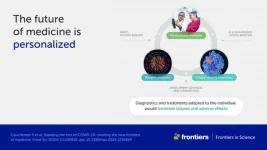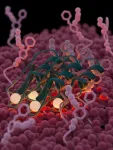(Press-News.org) COLUMBUS, Ohio – Economic difficulty caused by the COVID-19 pandemic led to a cascade of connected problems for some parents – resulting in mental health problems for their children, a new study suggests.
Researchers found that economic insecurity was linked to higher levels of depressive symptoms for parents, which was then associated with poorer relationship quality for the couples. That was linked with more harsh parenting and then to increased internalizing behaviors for their children.
“Pandemic-induced economic hardship had this downstream spillover effect that was ultimately linked negatively with their children’s mental health,” said Joyce Lee, lead author of the study and assistant professor of social work at The Ohio State University.
“Our findings parallel with other descriptive research showing that children’s mental health plummeted during the pandemic.”
The study was published online last week in the journal Child & Family Social Work.
The study involved 259 parents raising one or more children ages 12 years or younger who said they experienced at least one pandemic-related economic hardship. The longitudinal survey, which included participants from across the country, focused on two different points during the early weeks of the pandemic.
One of the strengths of this research is that it didn’t just include middle-income families – in 31% of the families studied, the parents’ income was below $30,000.
Parents were asked about their depressive symptoms, relationship quality and harsh parenting practices. They were also asked about their children’s internalizing behaviors such as complaining of loneliness, crying a lot, and being fearful or anxious.
The researchers found a clear connection between these issues, Lee said.
It started with the pandemic-induced economic insecurity. Those parents who reported higher levels of economic insecurity at the time of the first survey also had higher levels of depressive symptoms at the same time. And that was linked to a more negative relationship with their partner at the time of the second survey.
“They were reporting more disagreements and arguments and fights among themselves during the pandemic,” Lee said.
That in turn was linked to reports of using more harsh parenting with their children. This included yelling, screaming and shouting at their child; and physical punishment such as spanking.
And finally, harsh parenting was linked to children who had internalizing behaviors such as frequent crying and loneliness. (Data from the study did not include externalizing behaviors, such as physical aggression and tantrums.)
“There are these cascading effects that begin with pandemic-initiated economic difficulties that all trickle down to children’s mental health,” Lee said.
While other studies have found that depressive symptoms in parents can be related to harsh parenting, one strength of this study is that it also included partner relationship quality, she said.
“Relationship quality is an important part of this. If you’re not doing well with your partner, that speaks to a wider family dynamic that can spill over to how you deal with your children,” Lee explained.
Findings also showed that there was not a significant gender difference in how mothers and fathers reacted when faced with economic problems during the pandemic. That was somewhat of a surprise since some reports said mothers took a larger hit to their careers because of COVID-19 and were more likely to take care of children at home when schools closed. That suggested mothers might do worse than fathers, but it wasn’t found in this study.
Lee noted that this was a relatively small sample, so more research is needed to confirm gender differences in reactions to the pandemic.
While this study was done during the early weeks of the COVID-19 pandemic, Lee said that the findings could be relevant to other disasters or issues that lead to economic downturns.
One implication is the need for interventions that could help mothers and fathers who are struggling economically to stop the cascade of problems leading to child mental health issues, she said.
But it goes beyond that.
“We need a better social safety net to catch these parents early on before the economic pressures lead to these negative consequences,” she said.
Co-authors on the study were Sehun Oh, Amy Xu and Angelise Radney of Ohio State; Shawna J. Lee of the University of Michigan; and Christina M. Rodriguez of Old Dominion University.
END
How family economic insecurity can hurt child mental health
Study examines cascading effects of COVID-19 money issues
2024-05-23
ELSE PRESS RELEASES FROM THIS DATE:
Constantly on the hunt for food: Harbor porpoises more vulnerable than previously thought to the disturbances from humans
2024-05-23
Summer is coming and that means more boats in the sea. Danish coastal waters are especially cluttered with small boats in the summertime. Locals water skiing, going fishing or just riding around the beautiful bays and fjords.
In general people relax and have a good time on the water, but that is unfortunately not the case for the harbor porpoise.
The more motor boats speeding noisily around, the more they are disturbed. And that can be a big problem for the animals.
Because the harbor porpoise is a relatively large animal that feeds on small fish it needs to spend a lot of time hunting. New research shows that it spends around 60 percent of its time on the hunt, but ...
Producing novel liquid crystals by stacking antiaromatic units
2024-05-23
In organic chemistry, π-stacking systems are supramolecular structures that arise due to the dispersion force, a type of intermolecular noncovalent interaction. They are a common occurrence in nature; the stabilized structure of DNA is a very prominent example of a π-stacking system, and so are the arrangement of amino acids in certain proteins. Interestingly, π-stacking can be leveraged in the design of materials with useful electronic and optical properties. These include organic semiconductors of various kinds, as well as conjugated polymers for sensing and biomedical applications.
Thus far, a good portion of technologically relevant π-stacking system has been limited ...
First pictures from Euclid satellite reveal billions of orphan stars
2024-05-23
The first scientific pictures from the Euclid satellite mission have revealed more than 1,500 billion orphan stars scattered throughout the Perseus cluster of galaxies.
Led by astronomers from the University of Nottingham, this discovery sheds light on the origins of these celestial wanderers.
The Perseus cluster, located 240 million light-years away from Earth, is one of the Universe's most massive structures, boasting thousands of galaxies. However, amidst this cosmic ensemble, the Euclid satellite captured faint ghostly light - the orphan stars - drifting between the cluster's galaxies.
Stars naturally form within galaxies, so the presence of orphan ...
VIDEO: Surrey astrophysicists explore new galaxies and streams of stars using new data from Euclid space telescope
2024-05-23
As the European Space Agency publishes the first findings from its Euclid space telescope, scientists from the University of Surrey are celebrating fresh insights from the data.
Dr Denis Erkal, Associate Professor of Astrophysics at the University of Surrey, studies how the gravity of the Milky Way pulls clusters of stars apart, creating streams of stars trailing across the galaxy.
Now, his model for how this happens (video HERE) has been confirmed by data from Euclid.
Dr Erkal said:
“For a long time, my modelling ...
Scientists reveal first data from Euclid telescope offering snapshot of cosmic history
2024-05-23
Scientists have released the first set of scientific data captured with the Euclid telescope, showing an exciting glimpse of the Universe’s distant past.
The telescope, launched in July 2023, is part of the Dark Energy Satellite Mission, which aims to map the dark Universe.
Led by the European Space Agency in collaboration with The Euclid Consortium - which includes astronomers at The University of Manchester in leadership positions – the mission seeks to unlock mysteries of dark matter and dark energy and reveal how and why the Universe looks as it does today.
Early observations, described in a series ...
Big data, AI, and personalized medicine: scientists reveal playbook aiming to revolutionize healthcare
2024-05-23
What should the medicine of the future look like? A team of scientists writing in Frontiers in Science lays out a bold vision for precision approaches to understanding, preventing, and treating diseases, driven by revolutionary technologies and new interdisciplinary collaborations between researchers and other health sector professionals. The internationally renowned authors – led by Prof Michel Goldman, recipient of the Blaise Pascal Medal 2024 for his exceptional contributions to immunology and healthcare innovation, and leading microbiologist Prof Philippe Sansonetti from the Institut Pasteur and Collège ...
First ever survey of A&E triage nurses highlights problems with a lack of training, low staffing, high stress and overflowing departments
2024-05-23
Peer-reviewed - survey - people
Nurses who assess patients at emergency departments would like more training and say their decisions can be negatively impacted by the high pressures of their work.
Researchers at the University of East Anglia conducted the first ever UK survey of triage nurses to discover the background, training and decision-making processes of this role in emergency departments.
Lead author Hugh Gorick, a PhD researcher at UEA’s School of Health Sciences who also works as an assistant practitioner in an NHS hospital’s Acute Medical Unit, said: “More than 24 million patients present to emergency departments ...
The global clean water crisis looms large
2024-05-23
Water scarcity will intensify with climate and socioeconomic change, disproportionately impacting populations located in the Global South. So concludes a new Utrecht University article published in Nature Climate Change on 23 May 2024, which used a state-of-the-art global water quantity and quality model to estimate clean water scarcity until the end of the century.
Humans require clean water for drinking and sanitation purposes, but also for the production of food, energy and manufactured goods. As communities and policymakers grapple with water scarcity issues on the ground, researchers ...
Antibiotic ‘Velcro’ gives bacteria a sticky situation
2024-05-23
A small antibiotic called plectasin uses an innovative mechanism to kill bacteria. By assembling into large structures, plectasin latches onto its target on the bacterial cell surface comparable to how both sides of Velcro form a bond. A research team, led by structural biologist Markus Weingarth and biochemist Eefjan Breukink at Utrecht University, mapped how the Velcro-structure is formed. Their discovery, published in the scientific journal Nature Microbiology, unveils a new approach that could have broad implications for the development of antibiotics to ...
City of Hope researchers to present investigational treatments for colorectal, kidney and blood cancers at 2024 American Society of Clinical Oncology (ASCO) Annual Meeting
2024-05-23
LOS ANGELES — World-renowned physicians and researchers from City of Hope®, one of the largest cancer research and treatment organizations in the United States, will present new data and offer expert perspectives on leading-edge cancer research and treatments in development at the 2024 ASCO Annual Meeting, which will take place in Chicago from May 31 to June 4. Highlights include the following:
2024 Best of ASCO® program: New data on mismatched unrelated donor peripheral blood stem cell transplantation
Late-breaking data on the phase 3 CodeBreaK 300 trial
Glofitamab monotherapy for patients ...
LAST 30 PRESS RELEASES:
Fecal transplants from older mice significantly improve ovarian function and fertility in younger mice
Delight for diastereomer production: A novel strategy for organic chemistry
Permafrost is key to carbon storage. That makes northern wildfires even more dangerous
Hairdressers could be a secret weapon in tackling climate change, new research finds
Genetic risk for mental illness is far less disorder-specific than clinicians have assumed, massive Swedish study reveals
A therapeutic target that would curb the spread of coronaviruses has been identified
Modern twist on wildfire management methods found also to have a bonus feature that protects water supplies
AI enables defect-aware prediction of metal 3D-printed part quality
Miniscule fossil discovery reveals fresh clues into the evolution of the earliest-known relative of all primates
World Water Day 2026: Applied Microbiology International to hold Gender Equality and Water webinar
The unprecedented transformation in energy: The Third Energy Revolution toward carbon neutrality
Building on the far side: AI analysis suggests sturdier foundation for future lunar bases
Far-field superresolution imaging via k-space superoscillation
10 Years, 70% shift: Wastewater upgrades quietly transform river microbiomes
Why does chronic back pain make everyday sounds feel harsher? Brain imaging study points to a treatable cause
Video messaging effectiveness depends on quality of streaming experience, research shows
Introducing the “bloom” cycle, or why plants are not stupid
The Lancet Oncology: Breast cancer remains the most common cancer among women worldwide, with annual cases expected to reach over 3.5 million by 2050
Improve education and transitional support for autistic people to prevent death by suicide, say experts
GLP-1 drugs like Ozempic could cut risk of major heart complications after heart attack, study finds
Study finds Earth may have twice as many vertebrate species as previously thought
NYU Langone orthopedic surgeons present latest clinical findings and research at AAOS 2026
New journal highlights how artificial intelligence can help solve global environmental crises
Study identifies three diverging global AI pathways shaping the future of technology and governance
Machine learning advances non targeted detection of environmental pollutants
ACP advises all adults 75 or older get a protein subunit RSV vaccine
New study finds earliest evidence of big land predators hunting plant-eaters
Newer groundwater associated with higher risk of Parkinson’s disease
New study identifies growth hormone receptor as possible target to improve lung cancer treatment
Routine helps children adjust to school, but harsh parenting may undo benefits
[Press-News.org] How family economic insecurity can hurt child mental healthStudy examines cascading effects of COVID-19 money issues





